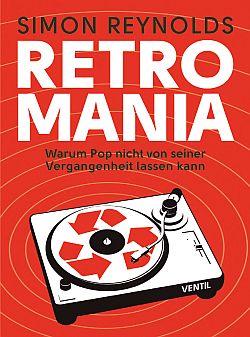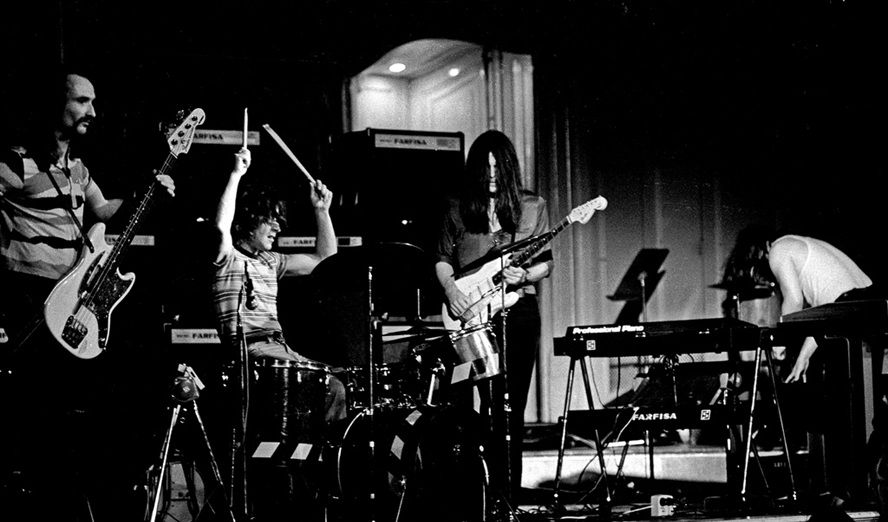In the Anglo-America world, the discussion of »Retromania« was in full spate on the Internet
last autumn, and it had practically run its course already when it took off in the German-
speaking countries in the following winter. But let’s go back a few more years. It was the
mid-nineties when I met the renowned pop theorist Simon Reynolds in a Vienna coffee house
for an interview. I was the curator of the symposium on »Pop/Rock Utopia« (held as part of
the ».W.I.E.N Sounds Fair«) and told Reynolds enthusiastically that leading pop music critics
and cultural studies experts had written great articles and presented them here in Vienna, but
at the same time I complained that the symposium had become a petty competition between
the ideologies (and proponents) of the sixties and seventies. Utopias, visions, propositions
or ideas for the future were a non-issue. There was nothing ambiguous in the message:
No UTOPIA in our house, RETRO is here to stay, the sixties & seventies are KING! And
Reynolds smiled.
»Always Trouble with the Rear-view Mirror«
With »Retromania«, published last year and the German translation out now on Ventil,
Reynolds turned the tables, reminded musicians and audiences of their duties and thus
produced a top seller of pop (theory) books par excellence that made quite a splash last year.
In a nutshell: Today musicians mostly/just produce retro loops, and listeners mainly/only
want to hear pop music from the golden ages. Pretty smart.
As Didi Neidhart (who is also the author of the preface to the German edition
of »Retromania«) puts it in his article »Always Trouble with the Rear-view Mirror« (skug
88), Reynolds discusses »the self-made problem of rock music, always chasing an imaginary
primordial state that supposedly existed somewhere between pre-modernism and modernism
before it was trampled down once and for all by Roxy Music & co.«.
But let’s not remain on the aesthetic level, for Reynolds is one wily rascal. In »Retromania«
he impresses/strains most of the readers with an abundance of facts on the one hand, and
skilfully and perfidiously succeeds in distracting attention from a crucial detail on the
other: as one of the leading pop critics, Reynolds himself has since the eighties contributed
considerably to the very problem he now pretends to identify. The music critics not only
hailed the sixties and seventies as the »ultimate golden ages« in the history of pop but
practically set it in stone. All music has had to subordinate itself to pop’s hegemony ever
since, is nothing but a copy or a blueprint, a mere imitation or retro.
With »Retromania«, Reynolds once again proves to be one of the leading top-pop archivists,
but he draws questionable ideologically motivated conclusions. For everything has to
be subordinated to the canon. Retromania, therefore, is by no means »a new disease of
civilisation«, as the »Süddeutsche Zeitung« wrote, but is regarded by most pop music
listeners and producers as a utopia of the two dominant pop ideologies (namely, of the sixties
and seventies). But the end of the reign of Retromania is already in sight.
The Third Great Pop Revolution
In the above-mentioned Vienna coffee-house conversation with Reynolds I also lamented
that as a format the traditional pop/rock group was basically outdated and that most music
by Anglo-American bands in particular seemed flat and insipid – as if a country had been
robbed of its cultural resources (by the way, an argumentation that today reminds me of Polly
Higgins‘ ecocide concept, see Elevate Festival 2012). Furthermore that critics only took
notice of copies of old heroes and were not interested in rebellious music, and that new stuff
was hardly released on independent labels any more but was put on the Internet instead.
Contrary to one of the main arguments in »Retromania«, innovations haven’t altogether
vanished in our epoch. Instead, due to the digitalisation of music and the (partial)
democratisation of pop thanks to the Internet (which Reynolds ironically is rather suspicious
of) and, as a consequence, the radical changes in and reorganisation of the worlds of popular
music, we are today not only living Retromania but are already in the middle of the third
great pop revolution. New compositional approaches and ways of working, along with
the incredible extension of music through the use of all sounds and noises available, have
changed our understanding of music completely.  You hardly need utopian visions any more.
You hardly need utopian visions any more.
Pop music cannot be dissed as retro for ever. Either you catch the wave or swirl on in the retro
vortex.
Still, Reynold’s »Retromania« is without doubt the quintessential pop theory book of the past
few years and probably will be for quite some time.
Simon Reynolds: »Retromania – Warum Pop nicht von seiner Vergangenheit lassen
kann«. Translated from the English by Chris Wilpert.
Mainz: Ventil-Verlag, 16 Oct. 2012, 432 pages, EUR 29,90
www.ventil-verlag.de
Reading tour Simon Reynolds/Chris Wilpert
16. 10. Berlin/Festsaal Kreuzberg, 17. 10. Hamburg/Golem, 18. 10. Cologne/King Georg,
19. 10. St. Gallen/Palace (CH), 20. 10. Munich/Optimal Plattenladen, 21. 10. Vienna/Phil,
22. 10. Wels/Schlachthof, 23. 10. Nuremberg/Musikverein, 24. 10. Maribor/Trauma, 25. 10.
Frankfurt/Orange Peel
Translated into English by Friederike Kulcsar



















